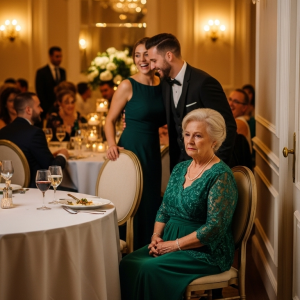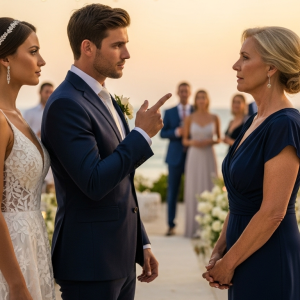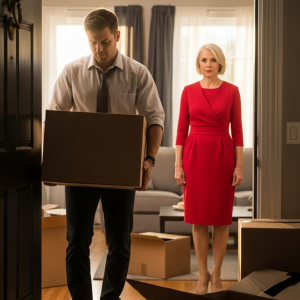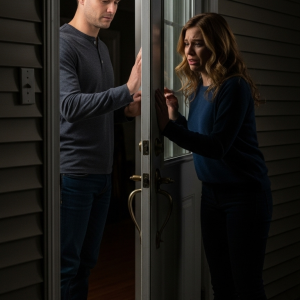Growing up in rural Texas, I was the black sheep of the Johnson family. For three generations, the Johnsons had farmed the same hundred acres, and a man’s worth was measured by the dirt under his fingernails. My dad and my two older brothers, Mike and Travis, were cut from the same tough, practical cloth. Meanwhile, I was hiding astronomy magazines under my mattress.
“Jesse’s got his head in the clouds again,” Travis would yell across the dinner table. “Leave some space in that brain for useful knowledge, son,” Dad would add, with a disappointed headshake I knew all too well.
They were waiting for me to grow out of it, to give up on science and dreams of college and embrace the family legacy of calloused hands. But I had other plans. For three years, I worked evenings at the local diner, saving every dollar in a lockbox under a floorboard in my room. It held $3,822. My ticket to somewhere—anywhere—that wasn’t here.
I didn’t hate farming, but I hated the narrow view of success it represented. The cycle never changed, and nobody seemed to mind but me. One day, I saw a notice in a newspaper at the diner: a state land auction. Among the listings was a 150-acre plot two hours west. I knew the area—it was practically desert, with poor soil and minimal rainfall. Worthless for farming. But something about owning my own piece of Texas, even a patch of scrubland, lit a fire in me. The minimum bid was $3,500.
The day of the auction, I lied about a school project and drove to the county courthouse. The room was full of seasoned ranchers who looked at me with amusement when my lot came up. “Lot 17,” the auctioneer droned, describing the land in terms that made it sound like the surface of Mars. “Opening bid is $3,500.” The room was silent. A few men chuckled. Before I could second-guess myself, my hand shot up. “Going once… going twice… Sold to bidder number 47 for $3,500!” I sat there in shock. I owned land. My land.
By the time I got home, a deed in my passenger seat, they were waiting for me in the kitchen. “You bought land?” Dad’s voice was dangerously quiet. “That wasteland out past Dryden? That’s what you spent your money on?” “It was a good price,” I said, trying to stand my ground. He slammed his hand on the table. “A good price for what? You can’t farm it! You can’t raise cattle on it! It’s worthless!” “What were you thinking, genius?” Mike jumped in. “Gonna build your own little space station out there?” “It’s my money,” I said, my voice shaking. “I earned it.” “Working at that diner while we picked up your slack here!” he roared. “And this is how you thank us? By throwing away good money on a sandbox?”
My mother tried to intervene, but Dad’s voice had gone cold again, which was always worse than the yelling. “Congratulations, son,” he said, each word dripping with disappointment. “You got what you wanted. Your own place, far away from all of us simple folk. You want that land so bad? Fine. Go live on it. Go to your desert, Jesse. And don’t bother coming back until you’re ready to be part of this family for real.”
The words were an ultimatum, an exile. I had expected anger, but not this. Everyone was staring, waiting for me to break, to apologize. But something hardened inside me. Seventeen years of feeling like I didn’t belong crystallized into a single moment of clarity. If I backed down now, nothing would ever change. “Fine,” I said, my voice steadier than I felt. “I’ll go.” Without another word, I turned and walked upstairs. An hour later, with a backpack of clothes, my remaining $300, and the terrifying freedom of having nothing left to lose, I drove away from the only home I’d ever known.
That first night, sleeping in the cab of my truck on 150 acres of dirt and not much else, the reality of my decision hit me hard. I was alone. But small towns have one advantage: word travels fast. The next day, Old Man Reeves from the local salvage yard called. “Heard you got yourself in a situation, Johnson boy,” he drawled. “Got an old RV sitting on my lot. Ain’t pretty, but it’s got four walls. You want it?” “Mr. Reeves, I’ve only got about $300 to my name.” “Did I mention a price? Just come get this eyesore off my property. Consider it an investment in entertainment. Whole town’s taking bets on how long you’ll last out there.”
The 1985 Winnebago became my palace. Life was a spartan routine of conserving water, searching for odd jobs in town, and enduring the pitying looks of the locals. It was lonely, but for the first time, nobody was telling me who to be.
Three weeks in, I found a dusty old telescope in a junk pile behind the RV. That night, I pointed it skyward. With no city lights for miles, the night sky exploded. The Milky Way was a brilliant, shimmering river. Through the lens, I could see the rings of Saturn and star clusters that looked like diamond dust. I was mesmerized. There was treasure here, just not the kind my family valued.
I started taking photos through the telescope with my phone, posting them to an Instagram account I called “Nomad’s Land.” To my surprise, people liked them. Comments poured in from strangers around the world, asking where on Earth I was getting such perfect, clear shots of the night sky. “Just my backyard,” I’d reply. That small connection to the world kept me sane.
About four months into my desert experiment, a sleek black SUV with government plates drove up to my RV. Two people in crisp, casual attire introduced themselves as Dr. Elena Vasquez and Dr. Michael Chun from NASA’s Jet Propulsion Laboratory. I thought I was hallucinating. “We’ve been monitoring your Instagram account,” Dr. Chun explained. “The image quality you’re achieving with basic equipment suggests this location has extraordinarily low levels of light pollution and atmospheric interference.”
They explained that NASA was searching for remote sites to place new deep-space observation equipment. My little patch of desert, they said, showed some of the most promising conditions they had ever seen. I sat there, stunned, as they laid out their proposal. NASA wanted to lease a portion of my land. Three weeks and several specialist visits later, we sat in my cleaned-out RV to sign the final contract. “We’d like to lease 100 acres for an initial period of ten years,” Dr. Vasquez said, sliding a revised contract across the table. I glanced at the number on the page and blinked. “That’s… that’s five million dollars,” I said, my voice barely a whisper. “Yes,” the NASA attorney confirmed. “Five hundred thousand per year, paid annually in advance.”
The land, they explained, was only part of it. What they were really paying for was the guarantee of continued pristine conditions. “Essentially,” the lawyer said, “we’re paying you to keep doing what you’re already doing: nothing.” The first payment hit my new bank account a few weeks later. My first purchases weren’t a sports car or a mansion. I bought a better solar power system, a reliable satellite internet connection, and a proper telescope. Then, I enrolled in online astronomy courses.
My life transformed. I replaced the old RV with a custom tiny house. I started a YouTube channel about amateur astronomy that, to my astonishment, gained over 100,000 subscribers in six months, providing its own comfortable income. I used my ridiculous good fortune to launch the Nomad’s Land Foundation, a non-profit dedicated to making space science accessible to kids in underserved rural schools.
Two years after signing the NASA contract, the local media got wind of the full story. An article, “From Outcast to Star Power,” was picked up by national outlets. Suddenly, I was getting interview requests from magazines and documentary filmmakers. The local news station from my hometown even ran a story. They showed a clip of my father, standing in the same farmyard where he’d kicked me out. “Jesse always had different ideas,” he said, his expression unreadable. “He found value where nobody else could see it. That’s the Johnson way, I suppose.” It wasn’t an apology, but it was the closest I’d ever get.
Five years after I was told never to come back, I was sitting in my tiny house when my brother Travis called. A historic drought had hit central Texas. The Johnson farm was on the brink of foreclosure. “Dad took out a big loan to expand a few years ago,” Travis explained, his voice heavy. “Bank wants their money, but there’s no crop to sell. We’re going to lose everything.”
Part of me felt a dark satisfaction, but a larger part knew that land represented generations of my family’s sacrifice. I had my foundation’s attorney draw up a farm rescue loan with fair but firm terms. Then I called Travis back. “I can help,” I said. “But I need to meet with Dad, face to face.”
The farm looked smaller, more worn than I remembered. Dad, Mom, and my brothers were all waiting on the porch. We sat at the same kitchen table where my exile had been declared. I laid out my proposal: a loan from the foundation, in exchange for them implementing sustainable farming practices and participating in an agricultural education program. Dad listened, his face unreadable. “You’ve done well for yourself,” he finally said. “That desert plot turned out to be quite the investment.” “It was never about the money, Dad,” I said quietly. “It was about finding something that was mine.” Mom started to cry silently. “We’re proud of you, Jesse,” she whispered. The words I had longed to hear for years finally came, but they rang hollow, spoken only in their moment of desperation. “Here’s the thing,” I said, looking directly at my father. “You don’t believe in me. You believe in what I can do for you now. And that’s fine. That’s business. This loan is a business arrangement. But let’s not pretend this is some heartwarming family reunion.”
His face hardened for a moment, then, surprisingly, softened. “What would it take?” It was the first honest question he’d asked me in years. “Time,” I answered. “Effort. An actual interest in who I am, not what I have. The loan is separate. But rebuilding a relationship… that’s going to take more.” “I’d like to try,” he said, his voice thick with emotion.
It wasn’t forgiveness. Not yet. But it was a beginning. A year later, my family attended my foundation’s annual Desert Night Sky Festival. They moved through the crowd of excited families and astronomy buffs like tourists in a foreign land. As I gave my keynote presentation, I saw my father in the back, his expression no longer one of polite interest, but something that looked like wonder. Afterward, he approached me. “You built all this,” he said, a statement of awe. “Not alone,” I replied. “I had help. Good people who believed in the vision.” He nodded slowly. “I should have been one of them from the beginning.”
Later that night, after the festival wound down, my fiancée Ellie and I lay on our favorite stargazing spot. A year earlier, under that same vast canopy of stars, I had asked her to marry me with a ring that held a small meteorite fragment. “You know what’s ironic?” I said, taking her hand. “If they hadn’t kicked me out, I never would have discovered what I was capable of. Sometimes the worst moments lead to the best outcomes.” The future, for once, looked as bright and vast as the desert night sky above us.
The night stretched endlessly above us, a velvet canvas scattered with fire. Ellie’s head rested on my shoulder, her breathing steady, grounding me in a way no constellation ever could. For years I had been chasing the sky, but she reminded me that some of the brightest lights were found right here on earth.
“I used to think the stars were escape routes,” I said softly. “Like, if I could just reach far enough, I’d get away from everything that hurt.”
She smiled in that quiet way she did when she was about to drop wisdom like a comet. “Maybe they’re not escape routes. Maybe they’re guideposts. Leading you back to who you’re supposed to be.”
The desert wind carried her words into me. For the first time in a long time, I didn’t feel like I was running. I felt… anchored.
In the months that followed, life became a strange blend of surreal and ordinary. By day, I was knee-deep in grant applications for the foundation, overseeing construction on NASA’s new observatory, and balancing online classes. By night, I’d return to my telescope, capturing new images to share with the followers who had become like an extended family.
The festival had changed everything. Our tiny desert outpost was no longer a curiosity; it was a destination. Families drove hours to attend weekend star parties. High school students wrote essays about the experience of seeing Saturn’s rings with their own eyes. A few even decided to pursue astronomy degrees. That thought alone kept me going on days when exhaustion threatened to take over.
But success came with shadows. My family had accepted my loan, but trust was still fragile. I visited the farm every few weeks to check on their progress with soil restoration and crop diversification. Dad was civil, even cooperative, but I could see the unspoken pride battle every time he had to ask for advice. Travis and Mike barely looked me in the eye.
One evening, while inspecting new irrigation equipment, Mike finally snapped.
“You think you’re better than us now, don’t you?” His voice carried that bitter edge I’d known since childhood.
“No,” I said, calmly. “I just think differently. That’s always been the problem.”
He kicked at the dry soil. “Dad worships you now. But when it was just us, breaking our backs on this land, you were too busy looking at the damn stars.”
I swallowed hard. The old guilt stirred, but I forced myself to answer. “I didn’t ask for worship. I just wanted respect. For once.”
Mike didn’t reply. But the silence was heavy enough to count as a truce.
Back at the desert, a new challenge awaited me. NASA’s lease had attracted attention from private companies. One evening, a convoy of glossy black trucks arrived, carrying a tech billionaire named Carson Vail. He wore jeans and boots that looked fresh from a catalog, the kind meant to signal “one of the guys.”
“Mr. Johnson,” he greeted me with a rehearsed smile. “Or should I say, Jesse the Star Man. I’ve been following your story. Very inspiring. I’d like to buy your land. All of it.”
My gut twisted. “It’s not for sale.”
He chuckled like he was humoring a child. “Everything is for sale. I’ll triple whatever NASA’s paying. You can walk away from all this with more money than you’ll ever need.”
I thought of the RV I’d first slept in, of the telescope pulled from junk, of Ellie’s laughter under the stars. Money wasn’t the measure anymore. “This isn’t about money,” I said flatly. “This is about purpose.”
His smile faltered. “Purpose doesn’t keep the lights on, son.”
I gestured to the solar panels gleaming in the sun. “Seems to be working fine here.”
He left in frustration, but I knew it wasn’t the end. People like him didn’t take “no” easily.
The pressure grew. Rumors spread online that Nomad’s Land might be sold, that NASA’s work here was at risk. I received angry emails from followers, pleading with me not to “sell out.” Local ranchers, jealous of my windfall, accused me of ruining the “heritage” of the region. For weeks, Ellie and I debated our options. Should we go public with the rejection of Vail’s offer? Should we confront the rumors directly?
One night, as I stared at the flickering campfire outside our tiny house, Ellie put her hand on mine. “Remember what you told me—that sometimes the worst moments lead to the best outcomes? Maybe this storm is just another guidepost. You can’t hide forever, Jesse. You need to step forward.”
She was right. I called a press conference.
Standing on a makeshift stage under the blazing desert sun, I faced a crowd of reporters, ranchers, and curious locals. “Five years ago,” I began, “I was the kid who didn’t belong. I was told the only thing that mattered was the dirt under my fingernails. But I found value in different dirt—the kind that reflects the stars instead of crops.” I paused, letting the murmurs settle. “This land is not for sale. Not to billionaires, not to developers. Because it’s not just land. It’s a vision. A place where kids from nowhere towns can look up and see what’s possible.”
The applause was hesitant, then grew. Not everyone believed me. But some did. And that was enough.
Weeks later, Ellie and I visited the Johnson farm again. Dad had aged visibly, the drought carving lines into his face deeper than time alone could. But something had shifted in him. He handed me a notebook—his own, filled with sketches of irrigation systems, soil tests, and even some astronomy notes copied from my foundation’s website.
“I’ve been learning,” he admitted. “Trying to see things the way you do.”
For once, I didn’t feel the old sting of sarcasm or dismissal. I felt… hope.
“Then maybe,” I said, “we’ve both come a long way.”
The years rolled on. NASA expanded their observatory, bringing scientists and students from around the world. The foundation grew, sponsoring rural kids in Texas, Arizona, and beyond. Ellie and I married under the desert sky, our vows spoken with meteor showers streaking overhead.
One night, long after the guests had gone and the music had faded, I walked alone to the ridge above our land. I thought of that first night, seventeen and terrified, with nothing but a truck and a stubborn dream.
I whispered to the darkness, as if my younger self might still be listening:
“You did it. You held on. You found your way.”
And overhead, as if in reply, the stars burned brighter than ever.




